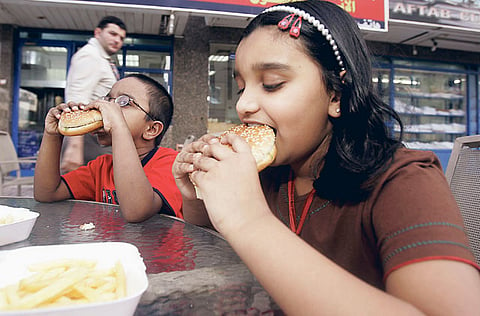Screening programme targets student health
WHO survey shows that a third of adolescents in Abu Dhabi are overweight or borderline obese

Abu Dhabi: Starting in the new school year, students from KG1 to Grade 12, with a Body Mass Index (BMI) percentile of less than five per cent or over 85 per cent will be required to seek medical assistance at their nearest clinic, Gulf News has learnt.
According to a Health Authority Abu Dhabi (Haad) senior official, students with a BMI of less than five per cent are considered underweight, and for those with a BMI of over 85 per cent, are at risk of being overweight.
The latest global school surveys conducted by WHO show that a third of the adolescent population (11 to 13 years old), across the emirate of Abu Dhabi are either overweight, or are border line overweight.
In response, Haad implemented an early detection campaign last year, in which a school screening pilot project involving 20 public schools was conducted.
During the second Weqaya press conference, Dr Jennifer Moore, Family and School Health Section Head at the Haad, explained to Gulf News that 126,000 public school students from KG1 to Grade 12 have undergone the school screening programme (SSP), however results will be announced by the new academic year.
Mandatory
The SSP consists of two types of screenings. The first is the mandatory screenings which include a student's medical history, BMI and vision.
The second is a highly recommended screening, which includes hearing, physical examination, complete blood count (to check for anaemia), and dental check up.
The rest of the 163,000 students across private schools are due to be screened by the new academic year. Dr Moore confirmed that adult screenings are to follow.
Even though each school across the emirate has a nurse, whose job is to inform parents, and Haad (through an Electronic Reporting System), on exact screening results for each student, Haad is still looking into increasing the number of nurses in schools.
"Haad ran a CME [Continuing Medical Educational] training programme for nurses last April and May in collaboration with the AHS [Ambulatory Health care Services] School Health Services — a subsidiary of the Abu Dhabi health services Company — on the BMI screening process, and referral process for over 280 school nurses across the emirate. The training will continue in the new academic year with hopefully more nurses," said Moore.
Dr Cother Hajat, Public Health Programmes Section Head at the Haad confirmed that both students and adults will be able to access their screening test results by next year through a personalised website, similar to what Emiratis have.
In the past two weeks, Haad has made it possible for Emiratis, to access their Weqaya screening test results through a personalised pin code by accessing www.weqaya.ae — which offers results for blood sugar level, cholesterol and BMI (to check risk of heart disease), and smoking (linked with severe diseases including heart attacks and cancer).
"Nowadays, people walk less; eat unhealthy food, and smoke more, which leads to high rates of diabetes and cardiovascular diseases," Jamal Al Ka'abi, Head of Customer Service and Corporate Communications at HAAD
"With 97 per cent of Emirati's carrying health insurance cards, Thiqa, and with the launch of an interactive website with personalised health card report results, Emirati's can now decide to take action by taking appointments and advise from concerned doctors. Our aim at HAAD is create a healthier society in Abu Dhabi," said Al Ka'abi.
HAAD statistics
Emirati's
• 97 per cent of Emirati's across the Emirate, have undergone laboratory tests through the Weqaya screening programme (the test includes risk for diabetes, and cardiovascular disease)
• 180,000 Weqaya Report cards will be delivered to Emirati's across the Emirate in the next two months
Expatriates
• A third of the adolescent population (11 to 13 years) across the Emirate of Abu Dhabi are either overweight or carry the risk of being overweight
• BMI less than five per cent for children indicates they are underweight
• BMI over 85 per cent for children indicates they are overweight
• 126,000 public school students HAAD has screened already
• 163,000 private school students HAAD will screen in the new academic year.
• 20 pilot projects for screening among public schools were held by HAAD
BMI percentile
A percentile calculator is used for ages 2 to 20, since during those years, gender, height, and weight, are prone to change.
What is a Body Mass Index (BMI) percentile?
The BMI percentile for a child tells how that child's BMI compares to the reference population of thousands of children on which the BMI chart is based. For example, if a boy is 8 years old and his BMI falls at the 60th percentile, that means that 40% of 8-year old boys have a higher BMI and 60% have a lower BMI than that child.
Source: Centres for Disease Control and Prevention (CDC)
How to get in touch
- www.weqaya.ae (a personalised website for Emiratis only, to find out more about their health screening results)
- 800-61116 (For the general public to book a check up appointment with a doctor)
What do you think of this initiative? Do you think the health of underweight children is often ignored by guardians?


